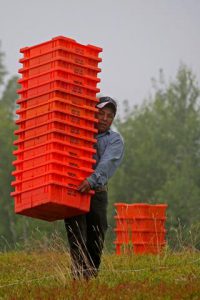
Photo credit: earldotter.com
APRIL 2020
Amy K. Liebman
UMASH Project Co-Investigator
Promoting Safety and Worker Health for Immigrant Dairy Workers
The COVID-19 pandemic has underscored the critical importance of those who produce our food. Deemed “essential” workers, these individuals continue to milk our cows, process our meat, plant our crops and harvest of our food. They do this while many of us have switched to a virtual, online world from the classroom to the office. And in many cases their work continues as usual but at great risk.
The reports from around the country are bleak. The meatpacking industry has been particularly hard hit as hundreds of workers have tested positive for COVID-19 and many are dying. Smithfield Foods shuttered one of its largest plants in South Dakota as it became the epicenter of the country’s largest outbreak with over 644 COVID-19 positive individuals tied to this one facility. Communities with meatpacking plants across the country report similar trends. Louisa County, Iowa, home to a Tyson pork processing plant, has a COVID-19 rate higher than New York state. This disruption in the food supply chain is widespread, impacting the farmers, producers and workers growing, harvesting and processing both animal and plant foods. And all need protection from COVID-19.
At UMASH, we embrace a One Health philosophy that emphasizes the connections between the health of humans, animals, and the environment. The relevancy of this approach expands greatly during this current crisis, wherein worker health is unquestionably tied to the health of the larger community as the virus spreads through workplaces.
Worker health and safety is public health, and keeping our workers safe from COVID-19 means keeping our communities safe.
State of Wisconsin Emergency Order
It is with this approach that we applaud the state of Wisconsin for their emergency order addressing ways to protect the state’s migrant farmworkers. It puts forth requirements regarding the posting and provision of information in the language of the worker including the emergency order itself and educational materials related to COVID-19 safe hygiene practices.
The order outlines the following steps that employers must take:
Social Distancing

The order recognizes that social distancing — the practice of staying at least six feet apart and avoiding all physical contact — is one of the most effective means of slowing the spread of COVID-19 and requires employers to ensure that workers maintain social distance in the fields, during other food production processing and on all transportation. It also offers guidance on sleeping arrangements, separating beds by at least six feet and sleeping head-to-toe.
Disinfection
 It calls for employers to provide sanitized cloth face coverings, to disinfect common areas and facilities and to provide hand-washing stations or hand sanitizer where migrants cook, eat, sleep and work, including in the fields.
It calls for employers to provide sanitized cloth face coverings, to disinfect common areas and facilities and to provide hand-washing stations or hand sanitizer where migrants cook, eat, sleep and work, including in the fields.
COVID-19 Cases
 Clear guidance on how to handle suspected cases of COVID-19 is also outlined. It notes where and how to isolate workers and underscores the need to provide food and water to isolated workers and to notify the health department of confirmed cases.
Clear guidance on how to handle suspected cases of COVID-19 is also outlined. It notes where and how to isolate workers and underscores the need to provide food and water to isolated workers and to notify the health department of confirmed cases.
The steps outlined in the order are basic, common-sense measures that other industries are already employing. Affording these basic rights to farmworkers provides protections to not only protect the wider communities but also to recognize and act on their status as “essential” to our food systems.
COVID-19 Resources

 Worker Safety is Safety for All of Us
Worker Safety is Safety for All of Us